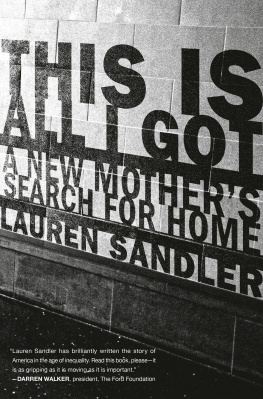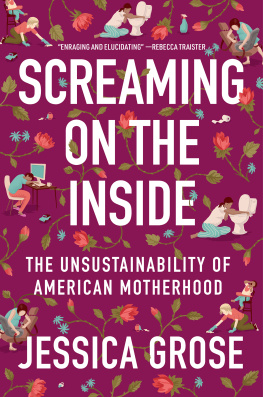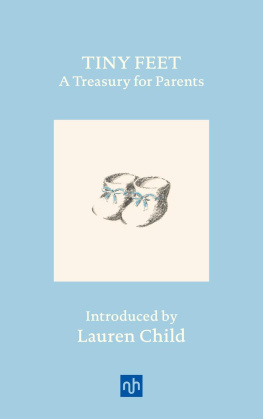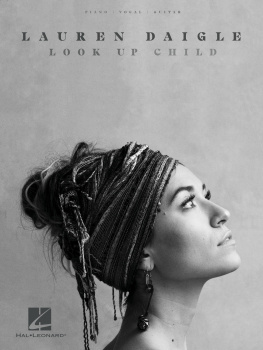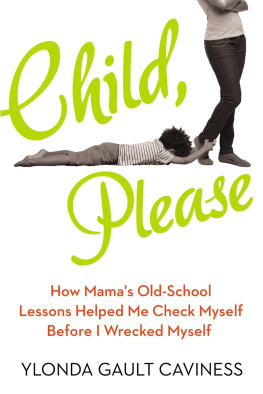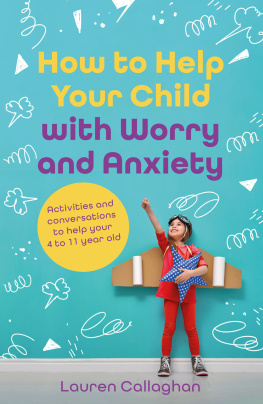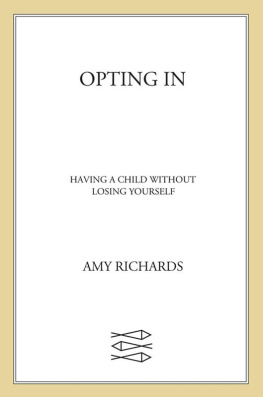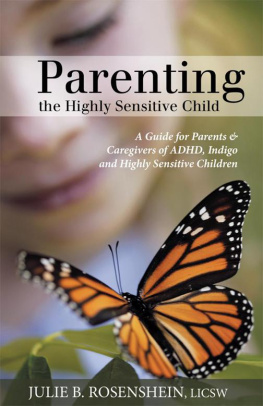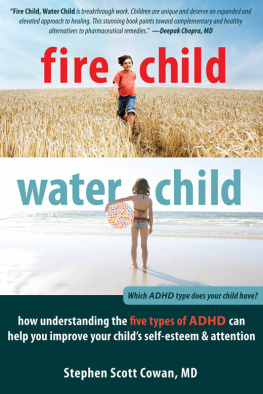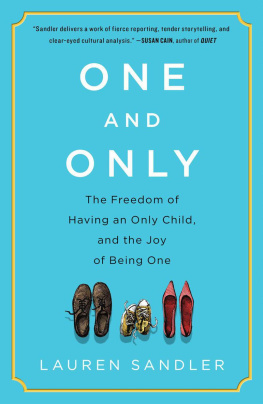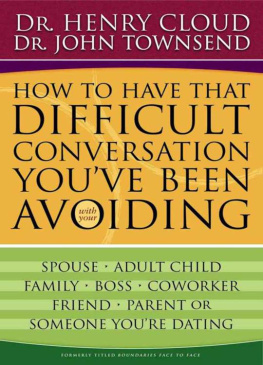ACKNOWLEDGMENTS
T his book would not exist without the profound support of the following people: James and Judith Sandler; Eric Hynes (who for two years cared for this book like his own), Carlene Bauer and John Williams (IFLYG); Marin Sardy; Priscilla Painton, Michael Szczerban, Sydney Tanigawa, and Jonathan Karp; Elyse Cheney; the members of the Invisible Institute; Reva Jarvis, Averi Giudicessi, and Lacie Zassman; Molly Peterson, James and Lucas Nguyen; Jon and Terry Lane; and most of all, Justin and Dahlia Lane, my heart and my home.
ALSO BY LAUREN SANDLER
Righteous: Dispatches from the Evangelical Youth Movement

JUSTIN LANE
LAUREN SANDLER has written on cultural politics and womens issues for publications including Time, New York, Slate, and The New York Times and is the author of a previous book, Righteous. You can find her at www.laurensandler.com.
FOR MORE ON THIS AUTHOR: Authors.SimonandSchuster.com/Lauren-Sandler
MEET THE AUTHORS, WATCH VIDEOS AND MORE AT
SimonandSchuster.com
Praise for One and Only
[Sandler] delves deeply, thoughtfully, and humorously into history, culture, politics, religion, race, economics, and of course, scientific research.... Will she or wont she have another? The beauty of her in-depth exploration is that the larger questions she poses make this one seem beside the point.
Lori Gottlieb, The New York Times Book Review
There is a welcome strain of argument undergirding this well-researched and lively book: looking out for your own happiness is not inconsistent with being a good mother. This is a vital part of the conversation thats not being discussed in the chatter surrounding middle-class parenting.
Jessica Grose, The New Republic
Sandler makes her case with zeal.... [She] certainly has a dramatic touch with language, and in her book she adduces a prodigious amount of reporting, data and research.... The data Sandler cite speak convincingly to the proposition that only children, at the very least, should not be negatively stereotyped.
The Washington Post
[A] thoughtful, well-reasoned book.... Sandler writes movingly.
The Boston Globe
[Sandler] blends a wealth of research with personal anecdote to argue that only children in fact grow up with significant advantages.
The Week
The impressive depth of Sandlers reporting... lends necessary rigor to important, emotionally complex questions of family size, parental well-being, and public policy. The result is a swift and absorbing read.... Her fervently argued book may be enough to change your mind and the national conversation.
Psychology Today
[Sandler] cuts at the core of one of modern womens most stubborn, self-defeating beliefsthat unless we are everything to all people, we are nothing, that our worth is tied up in our limitless capacity (at least when it comes to caring for others), that we dont actually deserve to live a selective life and take or leave a number of energy-sucking pursuits.
Courtney Martin, CNN
I couldnt put it down. The bookdespite what the cover saysisnt really about only children. This is what it is: Its about relationships with our kids, our spouse, our parents, and most importantly with ourselves. Its also about how scientific studies are often publicized to suit our own notions of right and wrong. Or ignored, if they dont match our morals.... Lauren isnt proselytizing; shes just stating it like it is. Seductively honest.
Randi Hutter Epstein, The Huffington Post
[Sandlers] questions have never been more relevant.... One and Only is peppered with lyrical anecdotes of her daily life (a tangle of limbs in a family hug, a bedtime standoff) that seem to remind us of every familys own intense, wonderful, maddening dynamic.
Nona Willis Aronowitz, The American Prospect
Journalist Lauren Sandler argues persuasively that being born a singleton isnt a tragedy, but a giftboth for a kid and their parents.
Sarah Weir, Yahoo
Why, Sandler asks, are prejudices about selfish and maladjusted single kids (and their parents) so widespread in our culture, despite much evidence to the contrary? Part of the answer has to do with myths about the happiness of singletons and their families, which Sandler debunks, but the book has a broader scope that makes it worthwhile for anyone interested in government policy and contemporary American culture.
Katherine Stewart, Religion Dispatches
One and Only should be required reading for any parent who wants to have only one child but thinks they should have two for the sake of the children. It should also be read by parents of multiples who feel that their one-child peers are somehow less as parents.
Michelle Richmond, San Francisco Journal of Books
One and Only has been a great solace to mothers of only children (this writer included).
Wendy Paris, The Jewish Week
Sandler delivers a work of fierce reporting, tender storytelling, and clear-eyed cultural analysis.
Susan Cain, author of Quiet
Lauren Sandlers book is eloquent, articulate, persuasive, and whip-smart. But its greatest virtue may be its restraint. This is, thank goodness, no faddish argument for only children. One and Only is something much wiser and much, much more important. Its a plea to disregard our facile (and demonstrably incorrect) stereotypes about family size and accept a universal truth: one size does not fit all .
Daniel Smith, New York Times bestselling author of Monkey Mind
Sandlers thought-provokingand often surprisinganalysis will fascinate anyone interested in how family circumstances shape our lives.
Gretchen Rubin, New York Times bestselling author of The Happiness Project
Sandler powerfully debunks generations of myths about the loneliness, selfishness, and general neuroticism of only children. Her book is a must-read both for adult only children and parents of just oneand an eye-opener for anyone interested in a fresh look at the meaning of connectedness.
Judith Warner, New York Times bestselling author of Perfect Madness
Sandler weaves a gripping tale of motherhood and modernity, bypassing the mommy wars to expose the wider conditions in which parenting choices are made. Shes one of the most cogent commentators on feminism and family there is.
Deborah Siegel, PhD, coeditor of Only Child
This book, like everything Lauren Sandler writes, is lush and riveting. Only children or people who have only children will find comfort in these pages, and parents generally should read it to understand their own choices.
Alissa Quart, author of Hothouse Kids
With wit, warmth, and keen intelligence, Sandler skewers the myths about only children and their parents. If youre tired of all the foolish generalizations, buy several copies of this book and hand them out at the playground!
Liza Featherstone, author of Selling Women Short
Onlies, parents of onlies, and readers still on the fence will find the book illuminating and affirming.
Publishers Weekly
[T]he authors argument dispels stereotypes of onlies and raises provocative questions about the American tendency toward prioritizing and even elevating parenthood over relationships, individuality, social networks and other aspects of adulthood, sometimes to the detriment of the family. Recommended as an alternative perspective on an often emotionally fraught discussion.
Kirkus Reviews
ONE
THE UNTEACHABLE EAGLE
I n the beginning, there was land. Land that needed to be planted and tended, animals that needed to be minded and slaughtered. A family was a workforce. The more children a family hadonce they were of able working age, by ten years oldthe more people could help turn surviving into thriving. Children were life insurance. Infant mortality was high; life expectancies were shortjust two centuries ago only half of all children survived past age fiveand blood meant everything. The lesson was clear: parent or perish. A labor unit of one was a close second to nothing. Furthermore, throughout the centuries when ones culture essentially began and ended at home, the society of a lone child was a hearth of darkness.


